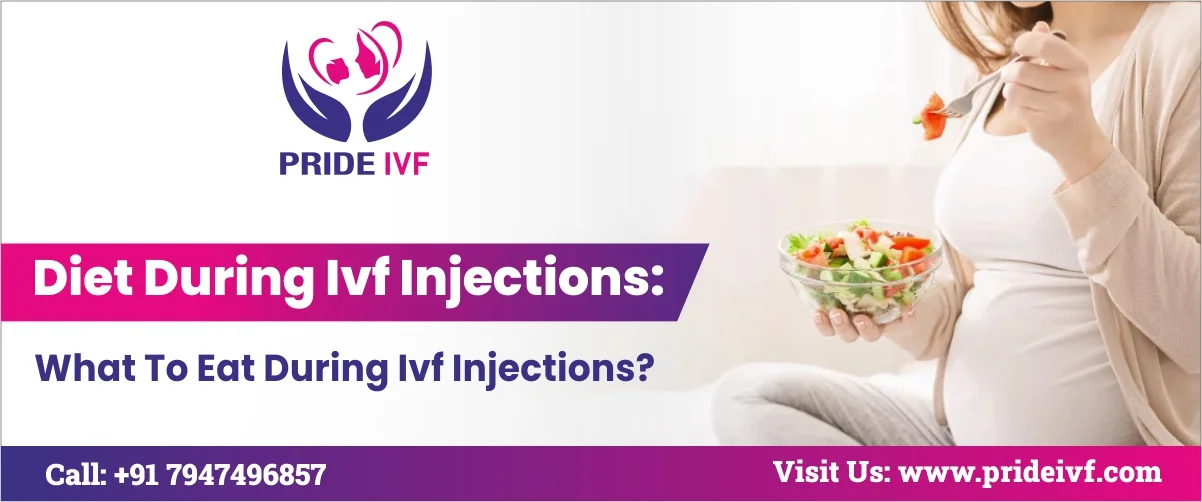In the complex process of fertility therapy, IVF injections are essential. These injections include the hormones required to promote egg formation, an essential in vitro fertilization phase. However, diet during IVF injections has a significant impact on their efficacy.
A nutritious diet that is well-balanced can help the body respond to these injections in the best possible way, improving the quality of the eggs and general reproductive health. The International Pride IVF Centre explores the significance of food during IVF injections in this blog post, providing tips on what to eat to help the fertility journey and increase the likelihood of a successful outcome.




Balanced Diet During IVF
The key to a successful reproductive journey is maintaining a healthy diet during IVF injections. A healthy diet minimize the side effects of ivf injections. Beyond its direct function, diet has a significant impact on both reproductive health and general health.
The body receives the building blocks required for ideal-quality eggs and embryo development from a diet high in critical nutrients. Folic acid, which is present in green vegetables and legumes and prevents neural tube abnormalities, is one of the essential nutrients. Egg formation and embryo development are supported by a proper protein intake from foods like meat that are lean, fish, and plant-based alternatives.
Healthy fats, such as those in avocados and almonds, help to maintain hormonal balance, which is important for IVF. Wholesome grains and vegetables, which include complex carbs, supply the steady energy required for the process.
In addition to increasing the likelihood that IVF injections will be successful, eating a balanced diet throughout the procedure promotes general well-being and helps the body become more healthy and better prepared for pregnancy.
Fertility and Folate
During IVF injections, the B vitamin folate, sometimes referred to as folic acid when used in its synthesized form, is essential. It is an essential vitamin that guards against neural tube abnormalities in growing embryos. Folate helps the growth of viable eggs and embryos during the IVF procedure.
In addition to promoting conception, including these items in your diet during IVF injections (Indian Diet Plan for IVF Success) lowers the chance of birth abnormalities like anencephaly and spina bifida in the event of a successful pregnancy, underscoring the need of making folate-rich food selections during this crucial period.
Good Sources:
- green vegetables like kale and spinach
- Lentils
- Beans
- Fortified cereals
Also Read: What to Avoid During IVF Injections
IVF and Protein
Protein is essential for IVF injections since it promotes the growth of the embryo (after embryo transfer diet chart) and the development of the egg. The ovaries are stimulated to generate more eggs as a result of these injections, and protein supplies the critical amino acids required for a healthy egg’s development. Furthermore, protein remains essential for the embryos’ quick cell division and development after fertilisation.
The amino acids required for optimum reproductive function are provided by a protein-rich diet during IVF injections. The odds of a good outcome are increased by ensuring an appropriate protein intake, which supports the whole IVF procedure from egg harvesting through embryo transfer.
Good Sources:
Lean meats
Fish
Eggs
Dairy products
Legumes
Tofu
Balanced Hormones with Fats
It’s important to comprehend the function of fats when it comes to food during IVF injections. While the saturated fats in processed diets may be bad for fertility, good fats are essential for hormonal balance and the best possible results from IVF.
The creation and operation of hormones depend on healthy lipids. They aid in the growth of healthy eggs and may increase the uterine lining’s susceptibility to embryo implantation. Additionally, these fats help in the absorption of essential IVF fat-soluble vitamins.
Good Sources:
Avocado
Nuts
Seeds
Fatty fish – salmon
Lets get started
Energy and Carbohydrates
Keeping levels of energy during the difficult IVF process requires carbohydrates. These macronutrients act as the body’s main energy source, giving you the endurance needed for doctor’s appointments, hormone treatments, and stressful situations.
In contrast to simple sugars, which cause blood sugar rise and crash, complex carbs offer continuous energy. Steady blood sugar levels aid in mood and energy regulation, which can be especially helpful while coping with the psychological difficulties of fertility therapy.
When you consume complex carbohydrates during IVF injections, you can be confident that your body will have the long-lasting energy it needs to support you through this process, both mentally and physically.
Good Sources:
Whole grains
Legumes
Vegetables
Water Intake and IVF
It’s crucial to stay hydrated when receiving IVF treatment in delhi. The body’s capacity to operate at its best is impacted by dehydration, which affects blood flow and the delivery of nutrients to the uterus and ovaries.
The risk of problems is reduced and the body responds to drugs better when it is well-hydrated. Additionally, it promotes general health and well-being, which is important when taking into account the psychological and physical strain of fertility treatments.
Aim to consume enough water each day, and watch your intake of alcohol and caffeine since these can both cause dehydration. An easy yet effective strategy to help your body during this complex procedure is to prioritize water as an element of your diet during IVF injections.
What to Avoid?
To reduce potential hazards, it is advisable to stay away from specific foods and drugs during IVF injections. These consist of:
- Processed foods can upset hormonal balance since they are high in harmful fats, sugar, and chemicals.
- Avoid drinking too much coffee and caffeine drinks since they may affect fertility.
- Alcohol Can alter hormone levels and degrade the quality of eggs and embryos.
- High mercury fish can be harmful to fertility, just as swordfish or sharks.
- Unpasteurized dairy carries a risk of bacterial infections.
- Soy products might alter the balance of hormones.
- Trans fats in many fried and baked items may trigger additional inflammation.
Tips for Meal Planning
- Each meal should contain a wide range of items from all dietary categories, such as protein from lean sources, vegetables, fruits, whole grains, and healthy fats.
- To keep your energy levels stable, choose nutrient-rich foods like yoghurt, almonds, or raw vegetables and hummus.
- Drink lots of water during the day, and for some variation, think about trying herbal teas or flavoured water.
- Eat carefully to enjoy every mouthful and pay focus on portion proportions.
- For advice on taking supplements like iron or omega-3s, speak with your ivf doctor in delhi.
- Reduce the amount of processed and sugary foods you eat.
Conclusion
It’s crucial to maintain a balanced diet while receiving IVF injections to increase your chances of having a successful pregnancy. A well-rounded diet full of vital nutrients promotes the formation of eggs, the development of embryos, and the maintenance of hormonal equilibrium. Keep in mind to drink enough water, keep away from unhealthy foods, and use sensible meal planning advice. Consult the professionals at the International Pride IVF Centre for thorough advice on diet during IVF injections and individualized assistance. They are committed to assisting you in realizing your dream of becoming a parent.




